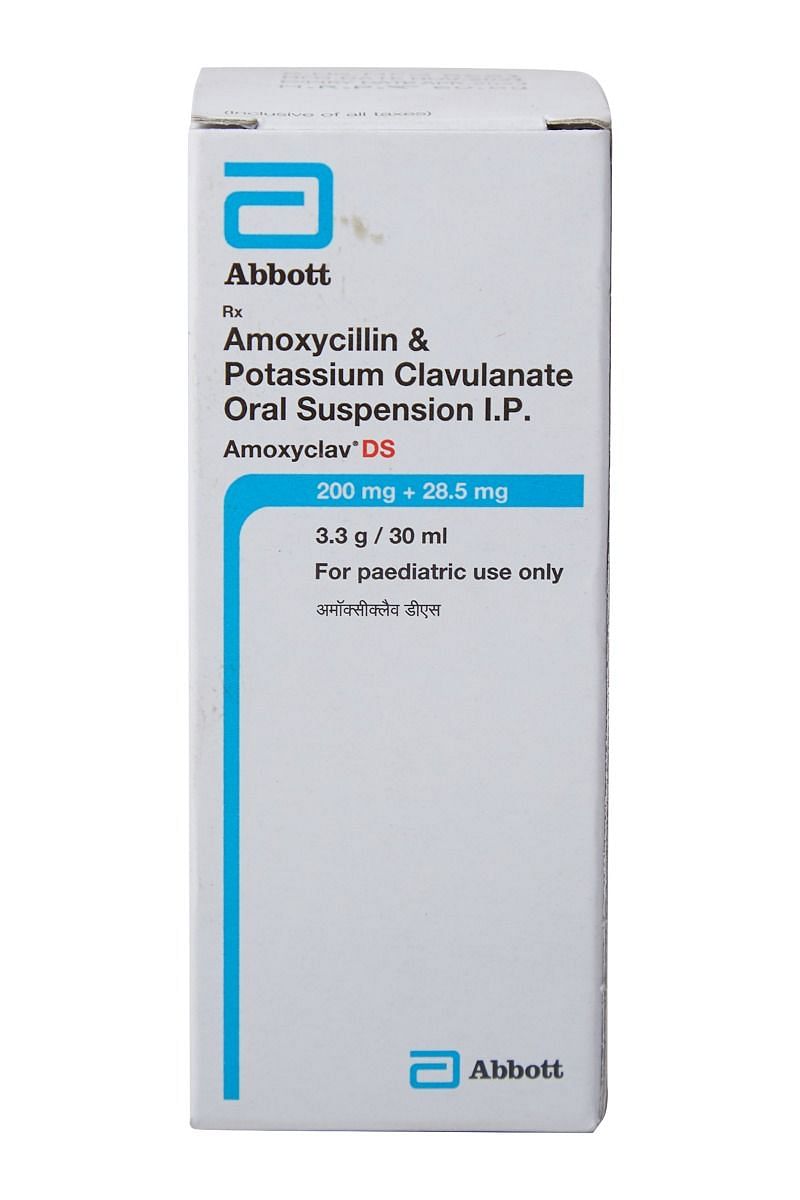
Moxigold CV Dry Syrup
Manufacturer
Theo Pharma Pvt Ltd
Salt Composition
Amoxycillin (200mg) + Clavulanic Acid (28.5mg)
Key Information
Short Description
Moxigold CV Dry Syrup is an antibiotic medicine that helps treat bacterial infections of the ear, nose, throat, chest, lungs, teeth, skin, and urinary tract.
Dosage Form
Dry Syrup
Introduction
Moxigold CV Dry Syrup is an antibiotic medicine that helps treat bacterial infections of the ear, nose, throat, chest, lungs, teeth, skin, and urinary tract. It is capable of killing bacteria that have become resistant to other therapies and thus also helps treat tuberculosis that is resistant to other treatments.
Directions for Use
Your child must complete the entire course of antibiotics. Stopping too soon may cause the bacteria to multiply again or cause another infection.
How it works
Moxigold CV Dry Syrup is an antibiotic. It has two active agents amoxycillin and clavulanic acid. Amoxycillin works by preventing the formation of the bacterial protective covering (cell wall) essential for the survival of the bacteria. Whereas clavulanic acid serves a special purpose of inhibiting an enzyme (beta-lactamase) that is produced by resistant bacteria. This makes the combination of amoxycillin and clavulanic acid an effective line of treatment for many types of infections.
Quick Tips
Your child must complete the entire course of antibiotics. Stopping too soon may cause the bacteria to multiply again or cause another infection. Your child may have a bitter taste in the mouth after the intake of Moxigold CV Dry Syrup. Eating citrus fruit or sipping plenty of water or fruit juice may help. Encourage your child to drink plenty of water in case diarrhea develops as a side effect. Never give Moxigold CV Dry Syrup until and unless prescribed by the doctor. Do not give Moxigold CV Dry Syrup to treat common cold and flu-like symptoms caused by viruses. Never save medicine for future illnesses. Check ‘expiry’ before giving Moxigold CV Dry Syrup to your child. Immediately discard all the expired medicines. Stop Moxigold CV Dry Syrup immediately if your child develops an itchy rash, facial swelling, or breathing difficulty. Report to the doctor without any delay.
Related Medicines

Moxikind-CV Dry Syrup

Advent 228.5mg Dry Syrup Tangy Orange

Amoxyclav Dry Syrup

Keymox CV Dry Syrup

Amokav 200 mg/28.5 mg Dry Syrup

Oa Clav Dry Syrup

Moxzer CV Dry Syrup

US Clave Dry Syrup

Veloclav Dry Syrup

Moxivib-CV Dry Syrup
Frequently asked questions
Can other medications be taken at the same time as Moxigold CV Dry Syrup?
Moxigold CV Dry Syrup may interact with other medications. It is crucial to inform your child's doctor about all the medications they are taking before starting this syrup. Additionally, it is advisable to consult a healthcare professional before giving any medication to your child.
Can I get my child vaccinated while on treatment with Moxigold CV Dry Syrup?
Generally, antibiotics do not interfere with the ingredients in vaccines and do not cause adverse reactions in children after a vaccination. However, it is advisable to delay vaccinations until your child recovers from their illness. Once they feel better, you can administer the vaccine.
What lab tests might be necessary for my child while taking Moxigold CV Dry Syrup long-term?
Periodically monitoring kidney and liver function tests may be required during prolonged therapy with Moxigold CV Dry Syrup to assess your child's condition.
Can I give a higher dose of Moxigold CV Dry Syrup than the recommended amount?
Giving a dosage higher than the recommended amount can increase the risk of side effects. If your child experiences any worsening symptoms, consult your doctor for re-evaluation.
Can I stop giving Moxigold CV Dry Syrup to my child once the symptoms subside?
No, do not stop administering this medication unless you have completed the full course of treatment. Even if you see improvement in your child's condition, it is essential to continue taking the medicine for the duration as it might be providing beneficial effects.
Can Moxigold CV Dry Syrup cause diarrhea in my child?
Yes, Moxigold CV Dry Syrup may result in diarrhea. This medication kills harmful bacteria and, during this process, can also disrupt the balance of helpful bacteria in your child's stomach.
Do all common colds require antibiotic treatment?
Most viral colds do not require antibiotics. In fact, prescribing antibiotics for a viral infection can worsen the situation and increase the likelihood of side effects. It is only necessary to start antibiotics under your child's doctor's guidance.
Is yellow or green mucus from my child's nose a sign of a bacterial infection?
Yellow or green mucus in the nose does not always indicate a bacterial infection. During a common cold, this type of mucus is normal and will thicken up, changing from clear to yellow or green. These symptoms usually persist for 7-10 days.
What signs signal that my child needs urgent medical attention?
Seek immediate medical care if your child experiences severe allergic reactions (breathing problems, skin rashes), gastrointestinal infections (diarrhea), or liver damage (weakness, paleness, vomiting). While rare, these side effects can be serious and require professional attention.


